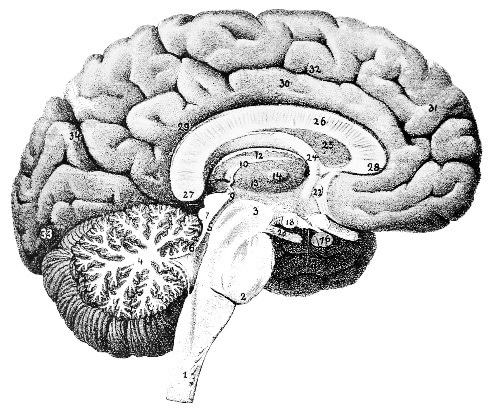Dec 3 2018
The spread of prions to the brain does not occur by direct transmission across the blood-brain barrier, according to a study published November 29 in the open-access journal PLOS Pathogens by Annika Keller and Adriano Aguzzi of the University Hospital Zürich, and colleagues. As noted by the authors, insights into how prions enter the brain could lead to the development of effective strategies to prevent neurodegeneration, even after infection outside the nervous system has already taken place.

Mesial view of the human brain. Image Credit: Popular Science Monthly Volume 46 [Public domain], via Wikimedia Commons
Prion diseases or transmissible spongiform encephalopathies (TSEs) are incurable brain diseases caused by modifications of the prion protein. Prions can be transmitted through contaminated food, surgical instruments and blood. Transmission of prions has caused the kuru epidemic in humans and bovine spongiform encephalopathy in cattle, which in turn has caused variant Creutzfeldt-Jakob disease in humans. Furthermore, injection of prion-contaminated hormones has caused hundreds of TSE cases. In order to develop drugs to prevent the spread of prions into the brain after exposure via food or medical procedures, it is necessary to gain an understanding of how prions propagate from the site of entry to the brain.
In the new study, the researchers tested whether prions in blood may enter the brain via blood vessels. To do so, they used genetically modified mice with a highly permeable blood-brain barrier -- a network of blood vessels and tissue that is made up of closely spaced cells and helps keep harmful substances from reaching the brain. Both genetically modified and unmodified mice were similar in their survival rates after infection with prions. These surprising results suggest that passage of prions through the blood-brain barrier may not be relevant to the development of disease. Taken together with past findings, the new results suggest that prions likely reach the brain by traveling along nerves in other parts of the body, similar to rhabdoviruses and herpesviruses.
Studies on mice possessing a permeable blood-brain barrier (BBB) add to the conjecture that prion spread from the periphery to the brain does not occur by direct transition across the BBB. Besides their significance for the basic understanding of prion neuroinvasion, these results may be of relevance to the possibility of developing effective post-exposure prophylaxis of prion diseases, which may prevent neurodegeneration even after extraneural infection has already taken place."
Annika Keller, University Hospital Zürich